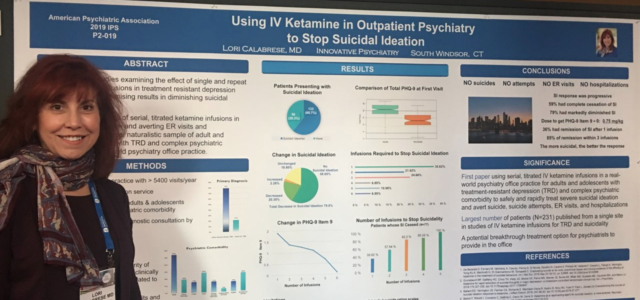Articles about Depression by Lori Calabrese, MD | The Ketamine Blog
The World Health Organization asserts that depression causes more disability worldwide than any other illness. In addition to standing alone as a disabling disorder, it also worsens other illnesses from diabetes, liver disease, heart disease, and brain injuries. We present these articles about depression to show the many ways this disorder is expressed, ways to treat it, and to dispel stigma caused by lack of information.
Causes
Depression and stress create a self-defeating cycle. Prolonged stress prunes the synapses, the dendrites attached to them, and the dendritic spines, reducing the network necessary for optimal signaling in the brain. Consequently, thinking slows and outlook darkens. In addition, creativity all but disappears. Depression follows this process, imposing yet more stress on the these all-important signaling structures.
Other structures in the brain enter the process. These structures in turn malfunction and make the symptoms worse. The lateral habenula, the amygdala, the thalamus, and the hippocampus each play a role in depression. By the same token, depression impacts them, too.
Treatment
Only about a third of people who suffer with depression find relief with traditional antidepressants. These medicines increase neurotransmitters in the brain and eventually increase neuron growth. But the actions of these medicines delay the process and these patients improve slowly. Sometimes, if the first trial with a medication doesn’t help, a different one or combination can help another one third or so of those who didn’t feel better after the first trial. Unfortunately, 33% of people suffering from depression find no relief from these medications. Until recently, they were left with little or no hope of relief for the rest of their lives.
Benefits of Ketamine Treatment
However, ketamine treatment is a novel and advanced treatment that has changed the prognosis for those treatment-resistant patients. Ketamine switches the mRNA to “On” which turns on the DNA to turboboost the brain-derived-neurotrophic-factor (BDNF) that proliferates neuronal growth along with synapses, dendrites, and dendritic spines which play such a vital role in improving signaling throughout the brain.
Another benefit of ketamine is how rapidly it causes the G proteins to slide off the lipid rafts in the cell membrane. This allows them to get back to work enhancing signals. It also causes the cell bursting in the lateral habenula to be dampened. Another process that allows you to experience a sense of reward – and feel better – when something good happens. Basically, ketamine treatment goes to work to help you feel better fast.
Then you enjoy clearer thinking and more creativity. Also a rewarding and upbeat outlook filled with light and joy. Add to that the improved initiative, increased motivation, and hope that makes life worth living again. This remarkable outcome occurs in 65-70% of treatment-resistant patients in general, and much more than that when the treatment is highly personalized. And the results are rapid and robust. Extraordinary.
As you read these articles about depression, keep in mind that there is always hope. Researchers continue to work to find more aspects ketamine’s effects on the brain that can impact the outcome.

This is the first Monday of the New Year…so how do you start a new year? With resolutions? A diet? Maybe more exercise? Lots of people do. But what about you? What if you don’t have an appetite…? Might be hard to stick to a diet more than a couple days… and what if you […]
Continue Reading

Can you believe it’s already December? We’re smack in the middle of the holidays! The last month of 2019 has begun. If this December is anything like the past, it will zoom by like a rocket. I hope your Thanksgiving was a joyful time for you. Going forward, it’s part of the tradition at this […]
Continue Reading

Thursday is Thanksgiving, and most of us realize what a toll the holidays take on some people. But we may not understand why. Many of us have at least one loved one who is not comfortable in a family gathering at this time of year. They may be in pain, or mourning a loss, or […]
Continue Reading

We’ve talked before about how your diet affects your microbiome, and how your microbiome affects your mood. We’ve also talked about how eating foods rich in fatty acids helps your brain function. Since we know that your eating affects your depression—we know that… and you know that—let’s talk today about how other foods impact your […]
Continue Reading

We’ve come so far in ketamine treatment for depression, and we still have so far to go. KRIYA held the first conference on ketamine treatment for depression in 2015. Now, 5 years later, there are several medical conferences that support the exchange of information in this field. Raquel Bennett, the founder of KRIYA – The […]
Continue Reading

Welcome to November… this is the month each year we dedicate to thankfulness and gratitude. I’m going to share with you some experiences I’ve had this week with gratitude, suicide research scientists, and the AFSP. No matter where you are in life, no matter your circumstances…if you think about it..look around you…there is most likely […]
Continue Reading

Just think about it. How far reaching is this one condition? Sure people talk about being depressed with a casual tone. You get the feeling they feel crummy…but it seems to be their response to circumstances. And when circumstances change, they seem to forget they felt bad. But when you think about who’s affected by […]
Continue Reading

Sam Chaney walked up to the quiet car in the dark. It was a place by the lake frequented by teens for romantic interludes, or beer drinking. This car was dark. Silent. But running. He tapped on the window with a bit of anxiety. He’d just been reading about the teen suicide epidemic this morning. […]
Continue Reading

We’re smack in the middle of a couple weeks focused on the quest for improved treatments for depression and anxiety. This past Thursday was World Mental Health Day, dedicated to raising awareness for mental health …and this year’s efforts were focused on “40 seconds of action” to help reduce the risk of suicide. Because every […]
Continue Reading

I just returned from the annual meeting of the American Psychiatric Association’s Institute for Psychiatric Services: Mental Health Services Conference, in NYC. This conference was presented in collaboration with the World Psychiatric Association. The World Psychiatric Association represents 120,000 psychiatrists in 120 countries. The heart and focus was that innovation and collaboration improve access to […]
Continue Reading









